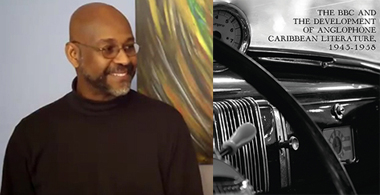Inspiration Across the Airwaves
 |
|
Glyne Griffith and the cover of his new book, which has been favorably described as part literary history and part literary biography. |
ALBANY, N.Y. (December 8, 2016) — The spark that lights a creative fire that in turn can brighten the entire literary world can be a relatively small thing — a book of poetry given as a present to a boy or girl; a new teacher who comes to town and opens up literary vistas to fertile minds. Or, it can be a radio show.
Such was the case in Caribbean nations when the British Broadcasting Corporation (BBC) decided in 1943 to create a literary radio program for the region’s English-speaking colonies. Officials at the BBC would have had no notion that “Caribbean Voices” in its 15 years on air would be a watershed in the development of Anglophone Caribbean literature.
That story is detailed by Department of English Associate Professor and Chair Glyne Griffith in his just-released The BBC and the Development of Anglophone Caribbean Literature, 1943-1958 from Palgrave Macmillan press.
Griffith said the British Government saw “Caribbean Voices” as part of a cultural response of amelioration and uplift after the widespread disturbances, strikes and riots that occurred across the region in the late 1930s. “The Moyne Commission, which was set up and sent to the region to discover the cause of the unrest, determined that one aspect of Britain's response needed to be educational reform in the English-speaking Caribbean.”
For three years, the show featured existing Caribbean writings, but in 1946, when the BBC put the show into the hands of Henry Swanzy, it was transformed into more of a creative workshop, developing and encouraging literature that reflected the color and diversity of the region. New writers with fresh perspectives emerged.
“The program, as overseen by the BBC, was meant to help prepare the black and brown middle classes in the Anglophone Caribbean for leadership positions in the region when full decolonization came,” said Griffith, who is an affiliate member of Latin American, Caribbean and U.S. Latino Studies.
“However, in Swanzy’s eight-year editorship of the program, it was guided much more by his sense of what was valuable in the region's developing literature than by what the administrative structure at the BBC expected the program to achieve.”
A Distinctly Caribbean Idiom
The government did not interfere directly in the program; it was not its practice to do so with BBC content. And neither the form nor content of the works presented were explicitly anti-colonial, said Griffith: “After centuries of colonialism, one could say that there was no longer the possibility of any space outside the culture thrown up by colonialism, either for the colonized or for the colonizer.
“What the literature did that was radical was that it asserted itself as part of the British literary tradition, but in an idiom that was decidedly and distinctively Caribbean. It became commonplace on the program to hear poems and prose fiction contributions that were written in the Anglo-creoles and vernaculars of the various territories.”
This practice became a distinguishing feature of much of the post-World War II literature that came out of the region. At the same time, many of these works, by such masters as George Lamming, V. S. Naipaul, Orlando Patterson and Roger Mais, drew upon and enhanced post-war modernism. British publishing houses soon recognized a market in England and Europe for, at first and most profoundly, Anglophone Caribbean novels, and then poetry and drama.
“The reading public at the time wanted something new and so these novels by aspiring writers from the British Caribbean were seen as fresh and to some extent also viewed as literary exotica,” said Griffith, who has conducted extensive research on Anglophone Caribbean literature and literary history in the context of post-colonial theory and criticism.
He serves as co-editor of the Journal of West Indian Literature. He is the author of Deconstruction, Imperialism, and the West Indian Novel (1996), editor of Caribbean Cultural Identities (2001) and co-editor of Color, Hair, and Bone: Race in the 21st Century (2008).
![]() For more news, subscribe to UAlbany's RSS headline feeds
For more news, subscribe to UAlbany's RSS headline feeds
A comprehensive public research university, the University at Albany-SUNY offers more than 120 undergraduate majors and minors and 125 master's, doctoral and graduate certificate programs. UAlbany is a leader among all New York State colleges and universities in such diverse fields as atmospheric and environmental sciences, business, education, public health,health sciences, criminal justice, emergency preparedness, engineering and applied sciences, informatics, public administration, social welfare and sociology, taught by an extensive roster of faculty experts. It also offers expanded academic and research opportunities for students through an affiliation with Albany Law School. With a curriculum enhanced by 600 study-abroad opportunities, UAlbany launches great careers.


